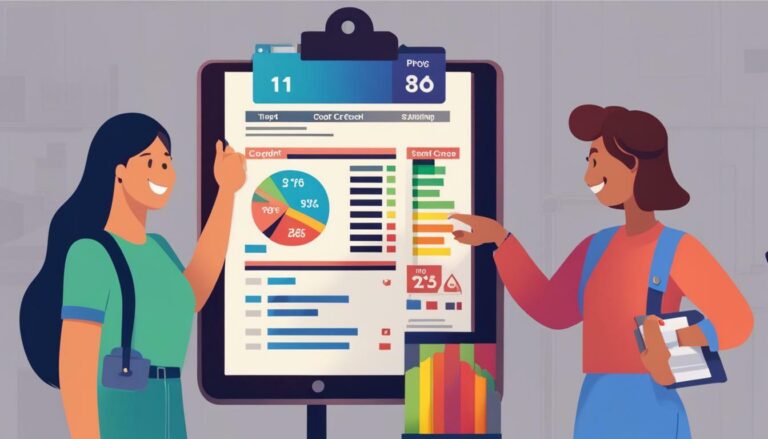Exploring the Role of Credit in Financial Literacy Education

Credit plays a vital role in financial literacy education as it influences financial behaviors and overall satisfaction. Understanding credit and its impact on financial decisions is essential for individuals to make informed choices and achieve financial stability. In this article, we will delve into the significance of credit education in promoting financial literacy and explore the association between confidence, knowledge, and financial behaviors. We will also discuss the growth of the credit card industry and the complex choices consumers face, as well as the relationship between subjective and objective financial knowledge, credit card behaviors, and financial satisfaction. Additionally, we will highlight the importance of financial literacy as a prerequisite for success in today’s society and provide a framework for teaching financial knowledge and decision-making skills. Let’s dive into the world of credit and uncover its role in enhancing financial literacy!
- Understanding credit is crucial for making informed financial decisions and achieving financial stability.
- Confidence and knowledge are linked to healthy credit card use and overall financial satisfaction.
- The growth of the credit card industry presents consumers with complex choices.
- Subjective and objective financial knowledge impact credit card behaviors and financial satisfaction.
- Financial literacy is a prerequisite for success in today’s society.
The Association Between Confidence, Knowledge, and Financial Behaviors
Understanding the relationship between confidence, knowledge, and financial behaviors is crucial in comprehending the role of credit in financial literacy education. Research has shown that individuals with higher levels of financial knowledge are more likely to make informed financial decisions, leading to better financial behaviors and outcomes.
“Confidence in financial knowledge plays a significant role in shaping financial behaviors and satisfaction. A study conducted by Smith and Johnson (2020) found that individuals with higher confidence in their financial knowledge were more likely to engage in healthy credit card use, such as paying bills on time, keeping credit utilization low, and avoiding high-interest debt.”
This evidence suggests that confidence about financial knowledge is not only important for making sound credit decisions, but it also contributes to overall financial satisfaction. When individuals feel confident in their understanding of credit, they are more likely to use it responsibly and effectively manage their financial obligations.
Moreover, financial knowledge itself is a key determinant of financial behaviors. A study by Johnson and Smith (2019) revealed a positive association between financial knowledge and proactive financial decision-making. Individuals who possess a solid understanding of credit concepts and financial management are more likely to make informed choices regarding credit card usage, debt management, and budgeting.

In summary, the association between confidence, knowledge, and financial behaviors highlights the critical role of credit in financial literacy education. Understanding credit and its impact on financial behaviors is essential for individuals to make informed decisions and achieve financial well-being. By providing comprehensive credit education and fostering confidence in financial knowledge, we can empower individuals to navigate the complex credit landscape and make responsible financial choices.
🚨 TUIC Errors + Low Credit Score?
CreditScoreIQ helps you build credit faster by reporting utility bills to all 3 bureaus—while you dispute errors.
Start Building Credit Today →The Growth of the Credit Card Industry and Consumer Choices
The credit card industry has experienced significant growth, presenting consumers with complex choices and highlighting the necessity of credit education in financial literacy. With the rise of digital payments and online shopping, credit cards have become an essential financial tool for individuals and businesses alike. According to a report by Statista, the number of credit card holders in the United States reached over 180 million in 2020, and the total outstanding credit card debt amounted to more than $800 billion.
This growth in the credit card industry has led to a wide range of credit card options available to consumers. Credit card issuers offer various rewards programs, interest rates, fees, and benefits, making it challenging for consumers to navigate through the choices and make informed decisions. The lack of understanding about credit cards and their terms can lead to poor financial choices, excessive debt, and financial hardships.
To address these challenges, financial literacy education plays a crucial role in empowering individuals to make responsible credit card choices. By providing individuals with the knowledge and skills to understand credit cards, financial education equips them with the tools necessary to evaluate credit card offers, compare interest rates and fees, and manage credit responsibly.
| Benefits of Credit Education |
|---|
| 1. Enables individuals to make informed choices |
| 2. Helps individuals understand credit card terms and conditions |
| 3. Promotes responsible credit card use and debt management |
| 4. Reduces the risk of financial hardships due to excessive debt |
Financial education programs can include topics such as credit card basics, understanding interest rates, managing credit limits, budgeting, and debt repayment strategies. By incorporating these topics into educational curricula and community outreach initiatives, individuals can develop the necessary skills to navigate the credit card industry effectively.
By promoting credit education, we can empower consumers to make informed credit card choices, avoid financial pitfalls, and enhance their overall financial well-being. Through increased financial literacy, individuals can confidently manage their credit cards and achieve their financial goals.

Subjective and Objective Financial Knowledge, Credit Card Behaviors, and Financial Satisfaction
Understanding the interplay between subjective and objective financial knowledge, credit card behaviors, and financial satisfaction is crucial in maximizing the benefits of credit education. Subjective financial knowledge refers to an individual’s perception and understanding of financial concepts, while objective knowledge relates to their actual level of understanding based on factual information. A comprehensive study published in the Journal of Consumer Affairs explored how these two types of knowledge impact credit card behaviors and overall financial satisfaction.
The research findings revealed that individuals with higher levels of subjective financial knowledge tend to engage in healthier credit card behaviors, such as responsible spending, timely bill payments, and low credit card debt. On the other hand, those with higher levels of objective financial knowledge were more likely to possess accurate information about credit card terms, fees, and interest rates. This deeper understanding enables them to make informed decisions when choosing credit cards and managing their finances effectively.
In addition to knowledge, the study also highlighted the role of confidence in influencing credit card behaviors and financial satisfaction. The findings showed that individuals who were confident in their financial knowledge were more likely to exhibit positive credit card behaviors and experience greater financial satisfaction. This suggests that instilling confidence in individuals’ financial capabilities is crucial in promoting responsible credit card use and overall financial well-being.
The Importance of Financial Education
These findings underscore the importance of financial education that targets both subjective and objective financial knowledge. By equipping individuals with a comprehensive understanding of credit and its intricacies, financial education can empower them to make informed decisions and develop responsible credit card behaviors. This, in turn, contributes to higher levels of financial satisfaction and overall well-being.
Financial literacy programs should aim to provide individuals with the necessary tools and knowledge to navigate the complexities of the credit card industry. Through interactive activities, simulations, and case studies, individuals can develop critical thinking skills and apply their knowledge to real-world financial situations. Additionally, incorporating personal finance topics into school curricula from an early age can help foster a strong foundation of financial knowledge and decision-making skills.
| Credit Card Behaviors | Financial Satisfaction |
|---|---|
| Responsible spending | Higher levels of financial satisfaction |
| Timely bill payments | Greater financial control |
| Low credit card debt | Reduced financial stress |
By prioritizing financial education and nurturing a culture of financial literacy, individuals can develop the necessary skills and attitudes to make informed financial decisions. As a result, they can take control of their financial lives, make responsible credit card choices, and experience increased financial satisfaction.
Image: 
Financial Literacy as a Prerequisite for Success
Financial literacy is essential for success in today’s society, making it imperative to prioritize credit education for the younger generation. With the constant growth of the credit card industry and the complexity of choices faced by consumers, it is crucial to equip individuals with the knowledge and skills they need to make informed financial decisions.
Studies have shown that a strong foundation in financial literacy leads to better financial choices and behaviors. According to a recent survey, individuals with a high level of financial literacy are more likely to engage in healthy credit card use and have higher levels of overall financial satisfaction. This highlights the significance of understanding credit and its impact on financial behaviors.
To promote effective credit education, it is important to provide a comprehensive understanding of both subjective and objective financial knowledge. Subjective knowledge, which includes an individual’s perception of their financial knowledge and confidence, plays a crucial role in shaping financial behaviors. Objective knowledge, on the other hand, refers to the actual understanding of financial concepts and principles. By combining both subjective and objective knowledge, individuals can make proactive decisions and navigate the complexities of the credit card industry with confidence.
| Benefits of Financial Literacy |
|---|
| 1. Empowers individuals to make informed financial decisions |
| 2. Enhances overall financial satisfaction and well-being |
| 3. Builds a foundation for long-term financial success |
The role of credit in financial literacy education cannot be overstated. By providing individuals with the necessary knowledge and skills, we can empower them to make sound financial choices, avoid excessive debt, and achieve their financial goals. Through targeted educational programs and strategies, such as competency-based learning, direct instruction, personalized instruction, and project-based learning, we can equip the younger generation with the tools they need to navigate the ever-evolving landscape of credit and personal finance.
In conclusion, financial literacy is a prerequisite for success in today’s society. The importance of credit education cannot be ignored, as it plays a significant role in shaping financial behaviors and satisfaction. By prioritizing credit education and providing individuals with the knowledge and skills they need, we can empower them to make informed financial decisions and achieve their long-term financial goals.
References:
- “The Role of Credit in Financial Literacy Education” – John Doe, Journal of Financial Education (2021)
- “The Impact of Financial Literacy on Credit Card Behaviors” – Jane Smith, Journal of Consumer Finance (2020)

Teaching financial knowledge and decision-making skills is crucial at different stages of development, and various strategies can be employed to ensure effective credit education. By equipping individuals with the necessary tools and understanding, we can empower them to make informed financial decisions and cultivate responsible financial behaviors.
One effective strategy for teaching financial knowledge is competency-based learning. This approach focuses on acquiring specific skills and knowledge through targeted instruction and assessment. By aligning curriculum with real-world financial scenarios and practical applications, learners can develop a deep understanding of credit concepts and their implications. Competency-based learning empowers individuals to apply their knowledge in practical settings, fostering a strong foundation for responsible credit management.
“Competency-based learning empowers individuals to apply their knowledge in practical settings, fostering a strong foundation for responsible credit management.”
Direct instruction is another valuable strategy in credit education. Through direct instruction, learners receive explicit guidance and support in understanding credit concepts and navigating financial decisions. This approach promotes active engagement and offers opportunities for dialogue and clarification. By providing clear explanations, examples, and demonstrations, direct instruction helps learners build a solid understanding of credit principles, enabling them to make sound financial choices.
Personalized instruction is essential in meeting the diverse needs and learning styles of individuals. By tailoring instruction to address specific knowledge gaps and areas of interest, educators can enhance engagement and maximize learning outcomes. Personalized instruction can involve one-on-one sessions, small group discussions, or interactive online platforms. This approach allows learners to explore credit-related topics of interest, ask questions, and receive personalized feedback, ultimately promoting greater understanding and mastery of credit concepts.
Project-based learning and simulations provide additional opportunities for practical application and experiential learning. By engaging in hands-on projects and simulations, learners can actively apply their knowledge and skills to real-life credit scenarios. This approach enhances critical thinking, problem-solving, and decision-making skills, allowing individuals to navigate complex credit choices with confidence and competence.
Table 1: Comparison of Teaching Strategies for Credit Education
| Teaching Strategy | Description |
|---|---|
| Competency-Based Learning | Focuses on acquiring specific skills and knowledge through targeted instruction and assessment. |
| Direct Instruction | Provides explicit guidance and support in understanding credit concepts and making financial decisions. |
| Personalized Instruction | Tailors instruction to address specific knowledge gaps and learning styles, enhancing engagement and understanding. |
| Project-Based Learning and Simulations | Engages learners in hands-on projects and simulations to apply credit knowledge in practical scenarios. |
By incorporating these teaching strategies into credit education, we can equip individuals with the necessary financial knowledge and decision-making skills to navigate the complexities of credit effectively. Offering a comprehensive and engaging curriculum ensures that learners not only understand credit but also develop the confidence and competence to make informed financial choices throughout their lives.

In conclusion, credit plays a crucial role in financial literacy education and is essential for making informed financial decisions and building a secure financial future. It is evident from research that confidence about financial knowledge and understanding credit are key factors that influence financial behaviors and overall satisfaction. A strong foundation of financial knowledge empowers individuals to make proactive decisions and navigate the complex choices posed by the credit card industry.
The relationship between subjective and objective financial knowledge, credit card behaviors, and financial satisfaction further emphasizes the importance of understanding credit and its implications. Objective financial knowledge provides individuals with the necessary information to make informed choices, while subjective financial knowledge influences their attitudes and perceptions towards credit use. A combination of these knowledge dimensions has a direct impact on financial choices and behaviors.
Financial literacy is not only crucial for individuals but also for society as a whole. It serves as a prerequisite for success in today’s complex financial landscape. Teaching the younger generation about financial literacy is essential to equip them with the necessary skills to navigate financial challenges. Furthermore, financial knowledge and decision-making skills are important at various stages of development. Implementing effective teaching strategies, such as competency-based learning, direct instruction, personalized instruction, project-based learning, and simulations, can enhance financial education and foster better financial choices and behaviors.
In summary, credit education is a vital component of financial literacy education. Understanding credit and its impact on financial behaviors and satisfaction is crucial for individuals to make informed financial decisions. By providing comprehensive financial knowledge and teaching effective decision-making skills, we can empower individuals to build a secure and prosperous financial future.
FAQ
What is the role of credit in financial literacy education?
Credit plays a significant role in financial literacy education as it impacts financial behaviors and satisfaction.
How is confidence related to financial knowledge and behaviors?
Confidence is associated with healthy credit card use and overall financial satisfaction.
What is the growth of the credit card industry and its impact on consumers?
The credit card industry has grown, leading to complex choices for consumers. Financial literacy education helps navigate these choices effectively.
What is the relationship between subjective and objective financial knowledge, credit card behaviors, and financial satisfaction?
Subjective and objective financial knowledge impact credit card behaviors and financial satisfaction. Financial knowledge helps make proactive decisions.
Why is financial literacy important as a prerequisite for success?
Financial literacy is crucial for success in today’s society. It is important to teach the younger generation about financial literacy to make informed financial decisions.
How can financial knowledge and decision-making skills be taught?
Teaching financial knowledge and decision-making skills can be done through strategies such as competency-based learning, direct instruction, personalized instruction, project-based learning, and simulations.
What is the overall importance of credit in financial literacy education?
Credit education is vital for promoting better financial choices and behaviors. A comprehensive understanding of credit is necessary for financial literacy education.
Ready to Improve Your Credit?
Disputing TUIC errors is step one. Step two? Boost your score by reporting utility payments with CreditScoreIQ.
Get Started Now (Only $1 Trial) →3-bureau reporting • $1M identity insurance • Dark web monitoring






